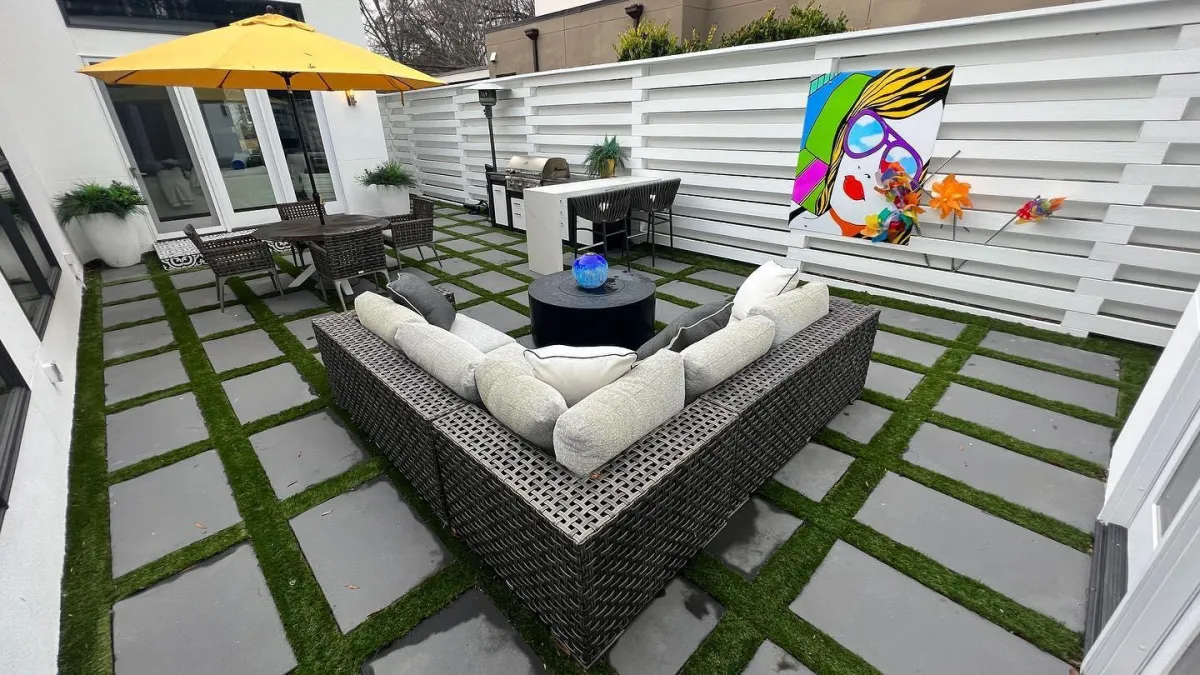Blogs

How Long Does Hardscaping Last?
Hardscaping can last anywhere from 10 to 30 years or more, depending on the quality of materials used, the craftsmanship of the installation, and the level of maintenance it receives.
Hardscaping transforms ordinary outdoor spaces into stunning, functional areas. But how long does hardscaping actually last? This is a common question for homeowners looking to invest in their outdoor living spaces. Longevity is a critical factor in ensuring that your investment remains beautiful and functional for years to come. At Greystone Hardscapes, we specialize in creating durable, high-quality hardscapes that stand the test of time.
Key Takeaways:
Hardscaping Longevity: The lifespan of hardscaping depends on the quality of materials, installation techniques, climate, and maintenance.
Durable Materials: Natural stone and high-quality concrete are among the most durable materials for hardscaping, often lasting several decades.
Proper Installation: Correct base preparation and installation techniques are crucial for the longevity of hardscaping projects.
Regular Maintenance: Regular cleaning, sealing, and prompt repairs are essential to extend the life of hardscaping structures.
Climate Impact: Local climate conditions, including freeze-thaw cycles and extreme weather, significantly affect hardscaping durability.
Investment Balance: While premium materials and professional installation have higher upfront costs, they offer greater long-term cost efficiency and durability.
Sustainability: Using eco-friendly materials and green practices contributes to more sustainable hardscaping solutions.
Innovations: Advances in materials and technology are continually enhancing the durability and resilience of hardscaping.
Greystone Hardscapes: This company specializes in creating high-quality, durable hardscaping projects with a focus on superior materials and craftsmanship.
Functional Benefits: High-quality hardscaping enhances property aesthetics, increases value, and provides functional outdoor living spaces.
What is Hardscaping?
Hardscaping encompasses the non-living elements of your outdoor space, such as patios, walkways, retaining walls, and outdoor kitchens. Unlike landscaping, which involves plants and other organic materials, hardscaping uses durable materials like stone, concrete, and brick to create permanent structures.
Factors Affecting the Longevity of Hardscaping
Several factors influence how long your hardscaping will last. The quality of materials is paramount; premium materials offer greater durability and resilience. Proper installation techniques are also crucial. If the base isn't prepared correctly or the materials aren't installed properly, the structure will be more prone to damage. Environmental factors like climate and weather conditions also play a significant role. Lastly, regular maintenance can significantly extend the life of your hardscaping.
Types of Hardscaping Materials and Their Lifespan
Natural Stone
Natural stones, such as granite, limestone, and slate, are renowned for their durability. Granite, for example, can last for several decades, if not centuries, with proper care. Limestone and slate also offer long lifespans but may require more maintenance to protect against weathering and erosion.
Concrete
Concrete is a versatile and durable material used in various forms, such as stamped, poured, and precast concrete. When properly installed and maintained, concrete hardscapes can last 25 to 50 years. Regular sealing and prompt repair of any cracks or chips are essential to maximizing its lifespan.
Brick
Brick is another robust hardscaping material known for its classic aesthetic and durability. With appropriate maintenance, brick structures can last for over 50 years. However, bricks can chip and crack over time, especially in areas with freeze-thaw cycles.
Wood
Wood is often used in decks and pergolas but requires regular maintenance to prevent rot, warping, and insect damage. Treated and well-maintained wood structures can last 10 to 20 years. Using high-quality wood and applying protective treatments can extend their life.
Composite Materials
Composite materials are modern alternatives designed to mimic the appearance of wood while offering enhanced durability. These materials are resistant to rot, insects, and weathering, with a lifespan of 25 to 30 years.
Installation Best Practices for Longevity
Proper installation is vital for the longevity of hardscaping projects. This begins with thorough base preparation, including excavation and the use of high-quality base materials. Correct installation techniques, such as ensuring proper drainage and using appropriate jointing materials, help prevent common issues like shifting and settling. Professional installation by experienced contractors, like those at Greystone Hardscapes, ensures that all these factors are meticulously addressed.
Maintenance Tips for Prolonging Hardscaping Life
Regular maintenance is crucial for extending the lifespan of your hardscaping. This includes cleaning surfaces to remove debris and prevent staining, sealing materials to protect against weathering, and controlling weeds and pests. Promptly repairing any damage, such as cracks or loose stones, prevents minor issues from becoming major problems. Seasonal maintenance, such as protecting against frost damage in winter, also plays a vital role.
Signs Your Hardscaping Needs Repair or Replacement
Over time, even the best-maintained hardscaping will show signs of wear. Common indicators include cracks and uneven surfaces, water drainage issues, fading and discoloration, and loose or shifting elements. Addressing these issues early can prevent further damage and extend the life of your hardscaping.
The Role of Climate in Hardscaping Durability
Climate significantly impacts hardscaping durability. Freeze-thaw cycles can cause materials to expand and contract, leading to cracks and other damage. High rainfall and humidity can accelerate weathering and erosion, while extreme heat and UV exposure can cause fading and degradation. Selecting materials suited to your local climate and implementing protective measures can mitigate these effects.
Benefits of Investing in High-Quality Hardscaping
Investing in high-quality hardscaping offers numerous benefits. It enhances the aesthetic appeal of your property, creating inviting and functional outdoor spaces. High-quality hardscapes also increase property value and provide long-term cost efficiency by reducing the need for frequent repairs and replacements.
Cost vs. Longevity: Finding the Balance
Balancing initial costs with longevity is essential. While premium materials and professional installation may have higher upfront costs, they offer greater durability and lower long-term maintenance expenses. Investing in quality from the outset ensures that your hardscaping remains a valuable and lasting feature of your property.
Environmental Considerations in Hardscaping
Sustainability is increasingly important in hardscaping. Using eco-friendly materials, such as recycled concrete and sustainably sourced stone, reduces environmental impact. Implementing green practices, such as permeable pavers that improve drainage and reduce runoff, also contributes to a more sustainable landscape.
Innovations in Hardscaping for Enhanced Durability
Technological advancements continue to improve the durability of hardscaping materials. Innovations such as high-performance concrete and advanced sealants offer enhanced resistance to weathering and wear. New installation techniques and materials also contribute to longer-lasting and more resilient hardscapes.
Greystone Hardscapes: Crafting Durable Outdoor Spaces
At Greystone Hardscapes, we pride ourselves on crafting durable and beautiful outdoor spaces. Our commitment to using the best materials and techniques ensures that our projects stand the test of time. From patios to outdoor kitchens, we create hardscapes that enhance your lifestyle and property value.
FAQs
How often should I seal my hardscaping?
Sealing frequency depends on the material. Concrete and stone should be sealed every 2-3 years, while brick may require sealing every 3-5 years.
Can hardscaping withstand extreme weather conditions?
Yes, with proper material selection and installation, hardscaping can withstand extreme weather. Materials like natural stone and high-quality concrete are particularly durable.
What is the most durable hardscaping material?
Natural stone, especially granite, is considered one of the most durable hardscaping materials due to its resistance to weathering and wear.
How do I know if my hardscaping needs repairs?
Look for signs such as cracks, uneven surfaces, water pooling, and loose elements. Addressing these issues early can prevent further damage.
Is professional installation worth the cost?
Yes, professional installation ensures that all aspects of the project are handled correctly, leading to a more durable and long-lasting hardscape.
Ensuring Longevity with Greystone Hardscapes for Lasting Beauty and Durability
Hardscaping is a valuable investment that can transform your outdoor space into a functional and beautiful area. By selecting high-quality materials, ensuring proper installation, and maintaining your hardscaping, you can enjoy these benefits for many years. At Greystone Hardscapes, we are dedicated to delivering long-lasting, exceptional hardscaping solutions.
You Dream It.
We Build It.
Superior Craftmanship.
Every Time.
Hardscape Services:
Copyright © Greystone Hardscapes Inc. 2025. All Rights Reserved. Privacy Policy. Terms & Conditions. Web Design by Fused Media

